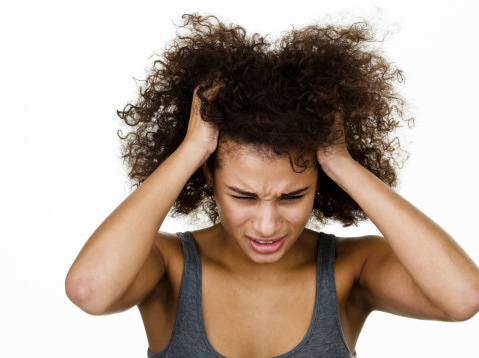If your scalp is very itchy, it could be due to one or more of several common reasons.
Why my Scalp is Very Itchy
Here’s a breakdown of potential causes and what you can do about them:
- 1. Dandruff: Dandruff is often characterized by white flakes and an itchy scalp. It can be caused by dry skin or a fungal infection. Anti-dandruff shampoos containing ingredients like zinc pyrithione, ketoconazole, or selenium sulfide can help.
- 2. Dry Scalp: If your scalp lacks moisture, it can become dry and itchy. Using a hydrating shampoo and conditioner, and avoiding products with harsh chemicals, can help.
- 3. Seborrheic Dermatitis: This condition leads to red, inflamed, and oily patches on the scalp, often with white or yellow scales. Treatment may involve medicated shampoos or topical treatments prescribed by a dermatologist.
- 4. Psoriasis: Scalp psoriasis can cause red, scaly patches that can be very itchy. Specialized shampoos and treatments from a dermatologist may be required.
- 5. Allergic Reactions: Hair products, dyes, or even laundry detergents can cause allergic reactions that lead to itching. Try switching to hypoallergenic or fragrance-free products.
- 6. Head Lice: Head lice cause intense itching and are often accompanied by visible lice or nits (eggs) in the hair. Over-the-counter or prescription treatments are available.
- 7. Fungal Infections: Ringworm of the scalp (tinea capitis) can cause itching, redness, and hair loss. Antifungal treatments are usually required.
- 8. Contact Dermatitis: An allergic reaction to a product or substance that comes into contact with your scalp can cause itching. Identifying and avoiding the irritant is key.
- 9. Scalp Folliculitis: Inflammation or infection of the hair follicles can cause itching and redness. Gentle cleansing and possibly antibiotics or antifungal treatments may be needed.
- 10. Stress: Stress can exacerbate skin conditions, leading to itching. Managing stress through relaxation techniques or counseling might help alleviate the itching.
If your itching is severe, persistent, or accompanied by other symptoms like hair loss or swelling, it’s best to see a dermatologist. They can help determine the underlying cause and recommend appropriate treatment.
How to Stop Itchy Scalp
To stop an itchy scalp, the approach will depend on the underlying cause. Here are some general strategies and treatments that can help alleviate itchiness:
1. Identify and Address the Cause
- Dandruff: Use anti-dandruff shampoos containing active ingredients like zinc pyrithione, ketoconazole, or selenium sulfide. Regular use can help control the fungus or yeast causing dandruff.
- Dry Scalp: Switch to a moisturizing shampoo and conditioner. Avoid products with sulfates or alcohol that can strip moisture. You might also benefit from using a scalp oil or treatment to hydrate the scalp.
- Seborrheic Dermatitis: Use medicated shampoos or topical treatments recommended by your doctor. Ingredients like coal tar or salicylic acid can help reduce inflammation and scaling.
- Psoriasis: Specialized shampoos containing coal tar or salicylic acid can be helpful. Topical treatments like corticosteroids or other medications may be needed; consult a dermatologist.
- Allergic Reactions: Discontinue use of any new hair products or dyes that may be causing irritation. Opt for hypoallergenic or fragrance-free products.
- Head Lice: Use over-the-counter lice treatments or consult a healthcare provider for prescription options. Follow up with a fine-toothed comb to remove lice and nits.
- Fungal Infections: Use antifungal shampoos or treatments as prescribed by a healthcare provider. It may take a few weeks to see improvement.
- Contact Dermatitis: Identify and avoid the irritant or allergen. Switching to gentler hair products can also help.
- Scalp Folliculitis: Keep your scalp clean and consider using a gentle, antibacterial shampoo. If the condition persists, seek medical advice for appropriate treatment.
2. General Tips for Relief
- Maintain Good Hygiene: Wash your hair regularly but avoid over-washing, which can strip the scalp of natural oils.
- Avoid Hot Water: Use lukewarm water instead of hot water when washing your hair, as hot water can dry out your scalp.
- Massage Your Scalp: Gently massaging your scalp while washing can help improve blood circulation and loosen flakes.
- Use a Humidifier: If you live in a dry climate, a humidifier can add moisture to the air and help prevent a dry scalp.
- Avoid Scratching: Scratching can worsen irritation and lead to infection. Try to manage the itchiness with treatments rather than scratching.
- Maintain a Healthy Diet: A balanced diet rich in vitamins and minerals can support overall skin health. Omega-3 fatty acids, found in fish and flaxseeds, may help with inflammation.
3.Seek Professional Help
If self-care measures don’t provide relief, or if you experience severe symptoms like significant hair loss, swelling, or persistent redness, consult a dermatologist. They can perform a thorough examination, provide a proper diagnosis, and recommend targeted treatments for your specific condition.










